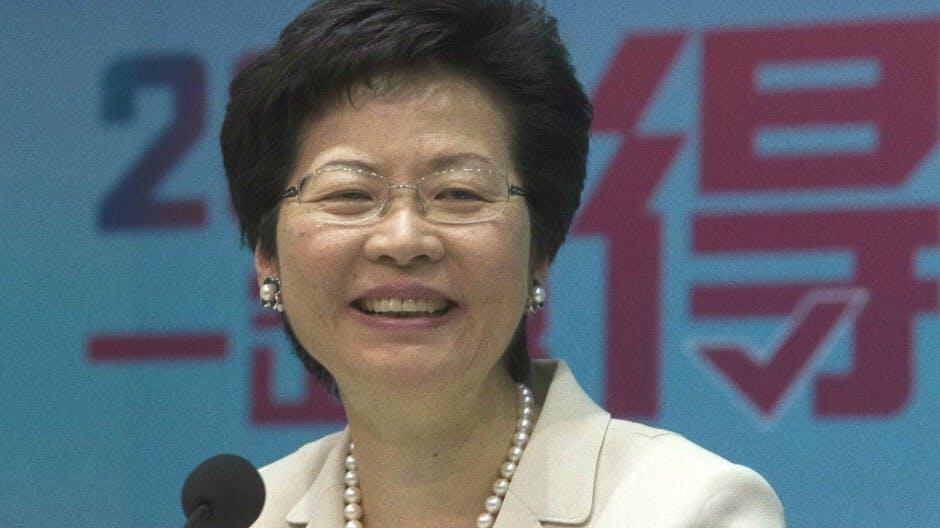Chief Secretary for Administration Carrie Lam Cheng Yuet-ngor has stated that political reform discussion could be resumed in the next government under the circumstances of “proper conditions, environment and atmosphere”. She echoed the view of former chief executive Tung Chee-hwa in that ideally the legitimacy of the future CE should be backed up by both political party support and a public mandate.
Carrie Lam’s comments open the door to the dialogue on electoral reform in the next government of the Hong Kong SAR. Nevertheless, she has not spelt out the meaning of “proper conditions, environment and atmosphere”. Arguably, one of the most important conditions for the resumption of dialogue on electoral reform is that all sides should adopt the principle of mutual respect. Without mutual respect, which implies the need for civilized dialogue and deliberative discussions, communications between the new government and stakeholders would be difficult.
The second principle would arguably be a socially stable environment so that all the political stakeholders would sit down to hammer out solutions to a variety of issues, ranging from the possibility of a political party law to the likelihood of resuming public consultation over the ways in which the CE and future lawmakers should be directly elected. Without a socially stable environment, persistent confrontations between any political camp and the government would undermine the difficult and long process of trust-building.
The third principle would be a politically constructive atmosphere rather than a destructive one. The 2014 “Occupy Central” movement proved to be politically disruptive to the entire process of trust-building. Instead, it deepened the already profound distrust among the political stakeholders, plunged Hong Kong into a politically and socially unstable environment, and has left deep political wounds on all sides of the ideological spectrum. The movement could be interpreted as a sign of generational change in Hong Kong’s opposition politics, but its impact on trust-building was arguably retrogressive. Even today, political distrust rather than trust can be seen in all the political camps, which are struggling for power in the Legislative Council through intensive direct election campaigns. The newly rising young politicians must understand that politics is not just about power grab but more to do with give and take if they really have the best interests of the people in mind.
Not Only a Matter of Methods
If what Lam and Tung suggested is to be implemented then Hong Kong people would have to consider a number of issues from now to the formation of the next government in 2017. Should we have a political party law to regularize the formation of all political parties? If yes, what should be the content of such political party laws? If no, should the current operation of political parties be more formally codified by putting forward some new guidelines and regulations? What would be the advantages and disadvantages of having political party legislation in Hong Kong? Should the new government consider producing a consultative document on this important matter? Should the CE and the principal officials be permitted to have affiliations with political parties? If the answer is yes, what effects would this have on the Executive Council, whose members are bound by the principles of confidentiality and collective responsibility? And what should be the communication channels between the Executive and Legislative Councils? Should a new office be set up to bridge the communication gap between members of either council? What should be the guidelines for party-affiliated principal officials and the politically neutral senior civil servants, who are expected to lobby legislators for support of government bills and policies?
These questions beg answers from all the political stakeholders, who arguably should not just focus on the methods of selecting the CE and the entire LegCo.
On selecting the CE, it’s to be expected that any serious discussion would mean a revisiting of the Aug 31, 2014 decision of the Standing Committee of the National People’s Congress. This inevitability would create uneasy feelings among some members of the opposition. But if they adopt an open-minded and realistic view in crafting a Hong Kong-style democracy suited for our unique political situation, the starting point for future dialogue over electoral reform would perhaps become less daunting. Moreover, the composition of LegCo could be a useful starting point to reach an agreement on the selection of the CE.
While Lam and Tung have pried open the door for future dialogue over electoral reform, the process would not be easy in the long run. However, in the short term, the September elections would generate new politics and new faces on all sides of the political spectrum. It would take time for them to build trust and adapt to the new political landscape. In the medium term, the CE election would inevitably generate political friction on all sides. Hence, the talk about electoral reform would not only depend on the goodwill of all political sides in the long run, but also hinge on the political development of the territory from now to the inauguration of the 2017 government — a challenging transition period that will require genuine trust-building.
(Cover Photo: Eye Press)



































